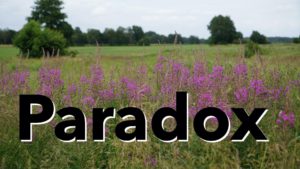Experiencing Paradox
Can you experience and understand paradox?
Paradox is defined as, ‘A statement or proposition seemingly self-contradictory or absurd, and yet explicable as expressing a truth.’ (Webster’s Dictionary)
Examples include:
- “Less is more”
- “The most corrected copies are commonly the least correct” (Francis Bacon)
In the book, Paradoxes of Group Life, Smith & Berg write: “Circles. One cannot escape the feeling that an exploration of paradox is like walking in circles. It is hard to know where you have come from and where you are going. But the more one lives with a paradoxical perspective, the more one develops a tolerance for circles and for the places where two apparently contradictory paths join.” (p. 151)
Many religious concepts are expressed in paradox … WHY?
- It is an expression of the inner and outer realities of our lives.
- We have a tendency to think in external and literal terms.
- We take exclusivist positions: “either / or”, rather than “both / and”
- We forget that we live in a world of appearances.
We are going to take a paradoxical journey over the next few months.
TASK FOR THE WEEK: Notice that which is paradoxical about your life. For example: Notice your reaction to other’s words. Notice how it can change from day to day. Notice how your mood colours your reactions to the situations and people you meet.
Recorded on Sunday 24 January 2021.

